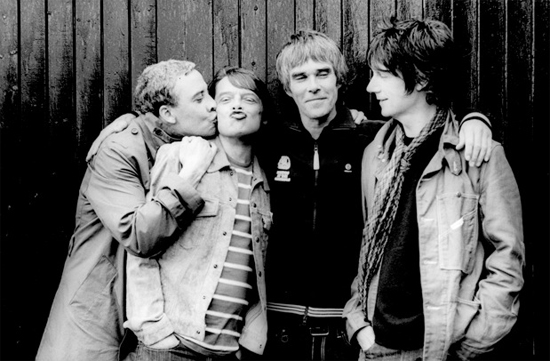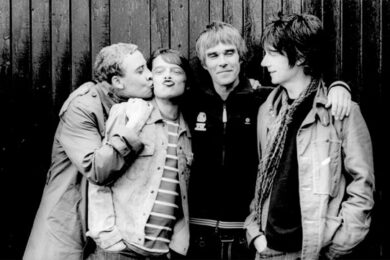The epithet ‘legendary’ has suffered severe abuse over the last ten years or so. It once had an end-of-pier charm, its native irony raising the curtain on magicians, crooners and ventriloquists half-forgotten even by those who know about such things: Sgt. Pepper’s was, in one respect, an extended riff on this melancholy knowingness. Lately, though, the term has been co-opted by Hollyoaks-haircutted students and stag-partiers polluting bars with laddish blather about alcohol consumption and sexual point-scoring. Because of this, the bands who soundtrack such feats of postmodern male heroism – hello, The Enemy; Kasabian, you fucking legends – have also been afforded the description.
For those within a couple of birthdays of my own 31 years, The Stone Roses are ‘legendary’ in a more etymologically precise way. People now hitting their fourth decade approached gig-going age somewhere between the Roses’ comeback tour of late 1995 and their notorious meltdown at Reading in 1996, with the result that the band came to be a cipher for all of the transformative experiences we’d missed by the skin of our teeth. We’d been too young for rave, just, and the possibilities embraced during that period – not only the apparent combinatory infinity of sample-based music, but the obliterative bliss of My Bloody Valentine and Sonic Youth – were to us no more than ideas encountered in the back-issues of Select handed down by older siblings. Despite the miniscule chronological gap between the early 90s and Britpop’s reestablishment of deference to received ideas, it was as if we were uncovering traces of some archaic belief system of which the Roses were avatars.
At Heaton Park, where the Roses are playing the second of three homecoming shows, the audience is split between those for whom the band symbolise this missed encounter with sublimity and people old enough to plausibly have attended the chaotic, era-defining gig at Spike Island in May 1990. Initial impressions suggest that there’s been a conscious effort to replicate some of the anarchy of that day. However, the disorganisation has been pasted onto another, financial imperative: here in stereotypically drizzly north Manchester, you queue for an hour to get a drink only to find that a small bottle of Fosters costs four pounds. Elsewhere, there’s acres of mud, worsened by the large numbers who’ve decided not to wait for the toilets and are instead pissing on any available upright surface. It’s as if the planners have cultivated a degree of low-level misbehaviour to cater to the nostalgia of those who were there first time around and the fantasies of those who weren’t.
Somehow, this mirrors one of the Roses’ most intriguing and troubling contradictions. They juggled styles, influences and ideas to create a blend – musical, lyrical and aesthetic – which implied emancipation and limitlessness, but also played right into the hands of more conservative, commodifying forces. Melodic guitar-pop, funk, Northern Soul, krautrock, the bass-heavy post-punk of Joy Division and PiL, Hendrix and dub were distilled into the sound; exuberant polysexuality, Situationist politics and geographically-detailed lyricism – hymns to the belt of chemical and salt-mining towns strung between Manchester and Merseyside – composed the poetic identity. This turned into a kind of radicalised regionalism, a take on northern England that maintained the pride and self-belief but jettisoned the pigeon-fancying fatalism and dodgy gender assumptions of kitchen-sink realism. However, what ensued was so multifaceted that it was hard to conceive of it in its totality, meaning that aspects of it could be appropriated for purposes far removed from the original context.
This perhaps explains the discontinuity between the Roses and their alleged offspring. Bands who try to conjure their spirit by siphoning off one or two components of the brew miss the point, but these simplifications often appeal to the marketing men desperate to capture and marketise the ‘authentic’ voice of Britain beyond London and the South-East. Liam Gallagher – here tonight fronting the less-than-inspiring Beady Eye – took Ian Brown’s perceived ‘arrogance’ and ran with it, but the similarity between Oasis and Brown’s band doesn’t extend much beyond attitude and a vaguely overlapping melodic intelligence. Kasabian seem at times to register the surrealist impulses of ‘Elephant Stone’ or ‘Sugar Spun Sister’, but are only clumsily imaginative when they seek to emulate them.
In the thick of the crowd, you wonder which aspect of the band’s identity drew many of tonight’s punters. If you’ve seen the opening of The Warriors, you’ll remember how it opens with a rally of all New York’s gangs. Heaton Park isn’t dissimilar, only the implausibly-costumed streetfighters have been replaced by members of every casual firm north of Northampton. Everywhere you look, there’s a CP Company zip-up or a Stone Island patch or a face half-recognised from some slightly forbidding pub visited on an away trip to Grimsby, Blackpool or Paisley. It occurs to me that many in the press assume a kind of retrogressive appreciation of the Roses happens amongst this – considerable – section of their fanbase, and that it works by mapping them with the same qualities as Oasis: there’s an assumption that it’s that ‘arrogance’, that ‘swagger’, those ‘legendary’ traits of Brown that impress.
But then the band come on and, as anticipated, go straight into ‘I Wanna Be Adored’, and it’s finally proven to me in the most empirical way possible that the Roses have nothing whatsoever in common with ‘Don’t Look Back in Anger’ or ‘Club Foot’, and that their appeal does indeed ride on something noble. From where I’m standing, they sound very tight, but the guitar line with which John Squire dresses Mani and Reni’s unmistakable opening groove still testifies to an experience of vulnerability none of the group’s imitators could ever confess to either lyrically or musically. The mood in the crowd changes: where there’d been a bit of needle prior to the beginning of the set, there’s now a connectedness which exceeds the boozy hugging this kind of crowd have a reputation for.
I’m still ambivalent, though. The sound is too low and, by the time we’re six or seven songs in the performance has been marked thoroughly by unevenness. It seems that there’s too much reciprocation between the band and the crowd, which means that any let-up by the audience in terms of showering the band with appreciation is sensed and translated into the music. The Roses aren’t, for all of their latter-day live competence – Brown’s singing is nowhere near as off as has been reported – types to plough on undeterred in the face of any psychological instability: several songs at the beginning of the set are executed with technical proficiency, but also without the kind of energy one would expect an event like this to inspire. In the crowd, levels of belief waver correspondingly.
Against the run of everything I forecast about this evening, it turns out to be ‘Ten Storey Love Song’ which brings equilibrium. On record, it’s the track which bears most resemblance to the lumbering lad-rock which attempts to claim lineage from the Roses, but here it’s performed with a brightness and precision which suggests nothing less than the respect and gratitude of the band for their fans. Rain slants across the stage, lathering the distant Pennines in mist, but the mutuality on which the performance depends is suddenly guaranteed. After that, ‘Standing Here’ and (inevitably) ‘Fool’s Gold’ are excellent, and the second half of the show largely follows suit.
It’s easy to be cynical about this reformation. My Twitter feed keeps returning disparaging remarks about the tragedy of middle-aged middle-managers attempting to relive Spike Island, the dreadfulness of Brown’s vocals, the inevitability of further intra-band discord and the general cultural irrelevance of the whole affair. I find it hard to tell how many of these thoughts are propelled by genuine dislike and how many are simply expressions of anxiety about being seen to profess sympathies for a group damned by association with any number of provincial indie discos and service station compilations. They’re also the bearers of an earnestness which makes some uncomfortable. I understand, and perhaps even share, certain reservations. But for those who felt cheated by having been born two or three years too late, that singularly unlucky generation who got Coldplay and Starsailor instead of a Roses or a Pistols or a Stones or even a Franz bloody Ferdinand, this offers a form of closure. The ending, ‘Elizabeth My Dear’ seguing into ‘I Am The Resurrection’, is as predictable as can be but arguably all the better for being so: as legends go, it’s a bit like meeting Robin Hood only to find that he actually does suck the jewels from the rings on his victim’s hands.
There’s no encore. Instead, there’s a firework display soundtracked by ‘Redemption Song’. It’s pretty dark, but it’s still possible to look around and see this has been widely perceived as a vindication of the band’s decision to reform and play these dates. Eventually, the crowd are funnelled out in increments, emerging to find that a shortage of shuttle buses and trams means most will have to walk the three or four miles back to Manchester city centre. At another show, in another city, I can imagine this provoking splutterings of discontent, but there’s a tacit understanding here that it’s the ability to produce or articulate a genuine experience of communality, one that’s far more successful than ‘Live Forever’ or ‘Rock and Roll Star’ in its blending of the universal and the particular, that makes the Stone Roses. It takes almost an hour to get halfway, but as thousands traipse south through Cheetham Hill I realise that this is a genuinely public moment of the kind Britain needs at the moment and that those of us born in the early eighties were mostly robbed of thanks to calendarial misfortune. Ultimately, in that case, it’s all been worth it.



